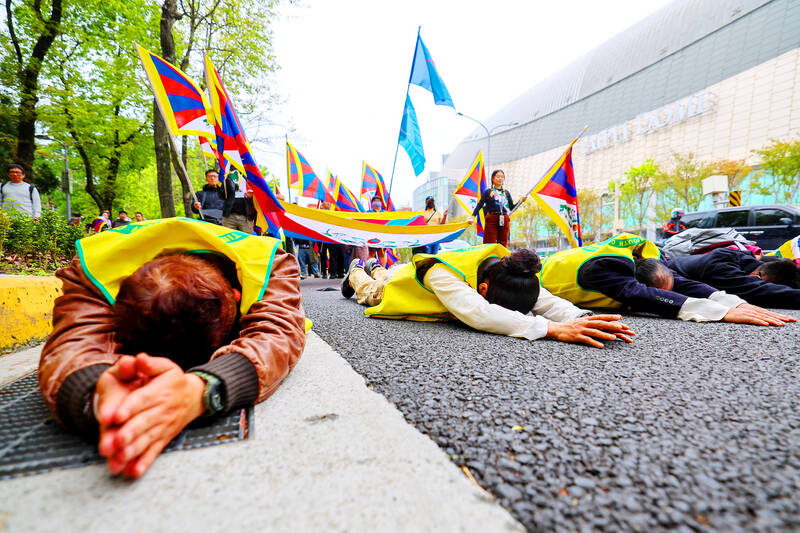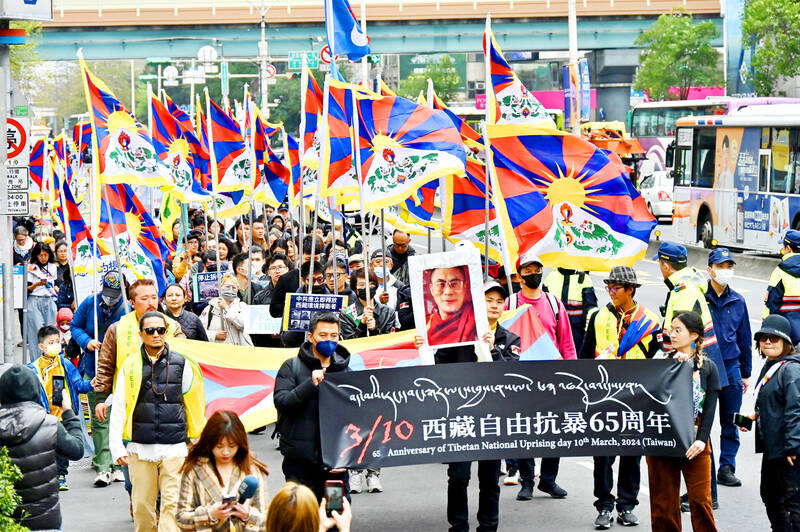Civic groups commemorating the 1959 Tibetan uprising in Taipei yesterday called for an end to China’s use of state-run residential schools to “exterminate” Tibet’s culture and language.
Kelsang Gyaltsen Bawa, representative to Taiwan of the Tibetan government in exile, one of the organizers of yesterday’s event, said that students at the schools are taught exclusively in Mandarin and forbidden from learning about Tibet’s history.
The Chinese government should cease its attempts to “exterminate” Tibet’s religious and cultural traditions by forcing people to study a Han-centric curriculum, Bawa said.

Photo: CNA
The UN said that as of last year, nearly 1 million Tibetan students attended state-run residential schools, which have been described as a form of “abduction and forced assimilation” by the European Parliament.
Tibetan Youth Association in Taiwan president Kunchok Lhakpa called on China to stop construction of a hydroelectric dam in Sichuan Province, which opponents say would submerge several ancient Tibetan monasteries.
Chinese police last month arrested more than 1,000 people protesting against the dam, nearly all of whom are still in detention, Lhakpa said.

Photo: George Tsorng, Taipei Times
Since the Tibetan uprising against Chinese communist rule on March 10, 1959, Tibetans have had no freedom and no human rights, Lhakpa said.
“The Chinese communists claim Tibet has become more open these past decades, and that Tibetans are living a great life. These claims are not true — no matter how beautiful Tibetans are on the outside, nothing compares to a lack of freedom on the inside,” Lhakpa said.
Li Wen (李問), who represented the Democratic Progressive Party at the commemoration, said that the Chinese People’s Liberation Army “forced” Tibetans to agree to the Seventeen-Point Agreement a year after invading in 1950.
Yet within less than a decade, Beijing breached the clauses in the agreement that said religion and customs should be respected, leading to the uprising in March 1959.
Following a violent crackdown by the Chinese government, the Dalai Lama fled to India, where he later formed a Tibetan government in exile.
An annual commemoration of the uprising has been held in Taipei since 2004.

Chinese spouse and influencer Guan Guan’s (關關) residency permit has been revoked for repeatedly posting pro-China videos that threaten national security, the National Immigration Agency confirmed today. Guan Guan has said many controversial statements in her videos posted to Douyin (抖音), including “the red flag will soon be painted all over Taiwan” and “Taiwan is an inseparable part of China,” and expressing hope for expedited reunification. The agency last year received multiple reports alleging that Guan Guan had advocated for armed reunification. After verifying the reports, the agency last month issued a notice requiring her to appear and explain her actions. Guan

GIVE AND TAKE: Blood demand continues to rise each year, while fewer young donors are available due to the nation’s falling birthrate, a doctor said Blood donors can redeem points earned from donations to obtain limited edition Formosan black bear travel mugs, the Kaohsiung Blood Center said yesterday, as it announced a goal of stocking 20,000 units of blood prior to the Lunar New Year. The last month of the lunar year is National Blood Donation Month, when local centers seek to stockpile blood for use during the Lunar New Year holiday. The blood demand in southern Taiwan — including Tainan and Kaohsiung, as well as Chiayi, Pingtung, Penghu and Taitung counties — is about 2,000 units per day, the center said. The donation campaign aims to boost

The Kaohsiung Tourism Bureau audited six hotels in an effort to prevent price gouging ahead of Korean band BTS’ concert tour in the city scheduled for Nov. 19, 21 and 22 this year. The bureau on Friday said that the audits — conducted in response to allegations of unfair pricing posted on social media — found no wrongdoing. These establishments included the local branches of Chateau de Chine, Hotel Nikko, My Humble House, and Grand Hai Lai, it said, adding that the Consumer Protection Commission would have penalized price gougers had the accusations been substantiated. The bureau said the Tourism Development Act

BACK TO WINTER: A strong continental cold air mass would move south on Tuesday next week, bringing colder temperatures to northern and central Taiwan A tropical depression east of the Philippines could soon be upgraded to be the first tropical storm of this year, the Central Weather Administration (CWA) said yesterday, adding that the next cold air mass is forecast to arrive on Monday next week. CWA forecaster Cheng Jie-ren (鄭傑仁) said the first tropical depression of this year is over waters east of the Philippines, about 1,867km southeast of Oluanpi (鵝鑾鼻), and could strengthen into Tropical Storm Nokaen by early today. The system is moving slowly from northwest to north, and is expected to remain east of the Philippines with little chance of affecting Taiwan,